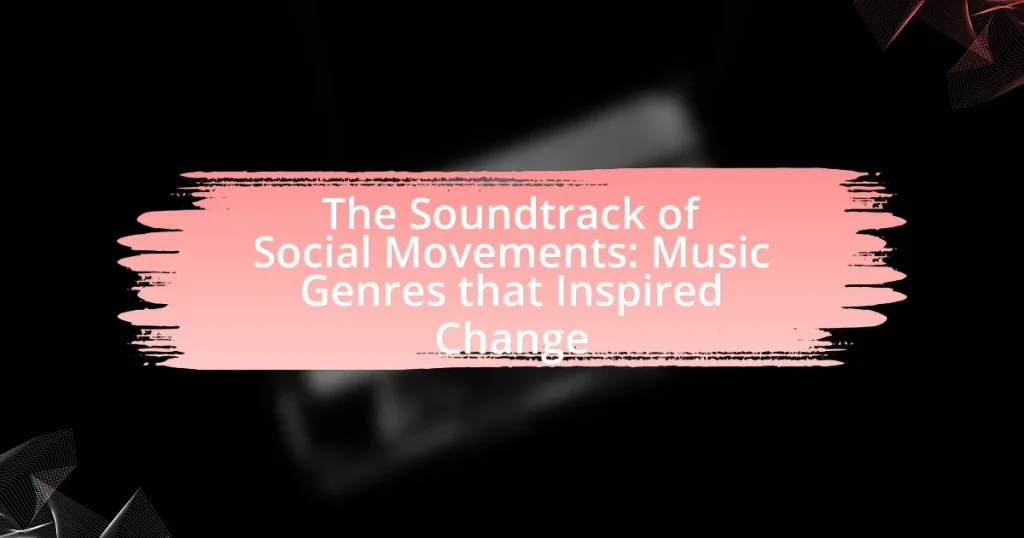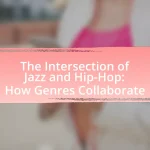The article examines the integral role of music in social movements, highlighting how various genres such as folk, rock, hip-hop, and reggae have historically mobilized communities and expressed dissent. It discusses key historical examples, including the Civil Rights Movement and the anti-apartheid struggle, illustrating how songs have served as anthems for change and solidarity. The article also explores the psychological effects of music on individuals and groups, the strategies for incorporating music into activism, and the potential pitfalls of its use in social movements. Overall, it emphasizes music’s power as a tool for expression, unity, and social change across different cultures and contexts.
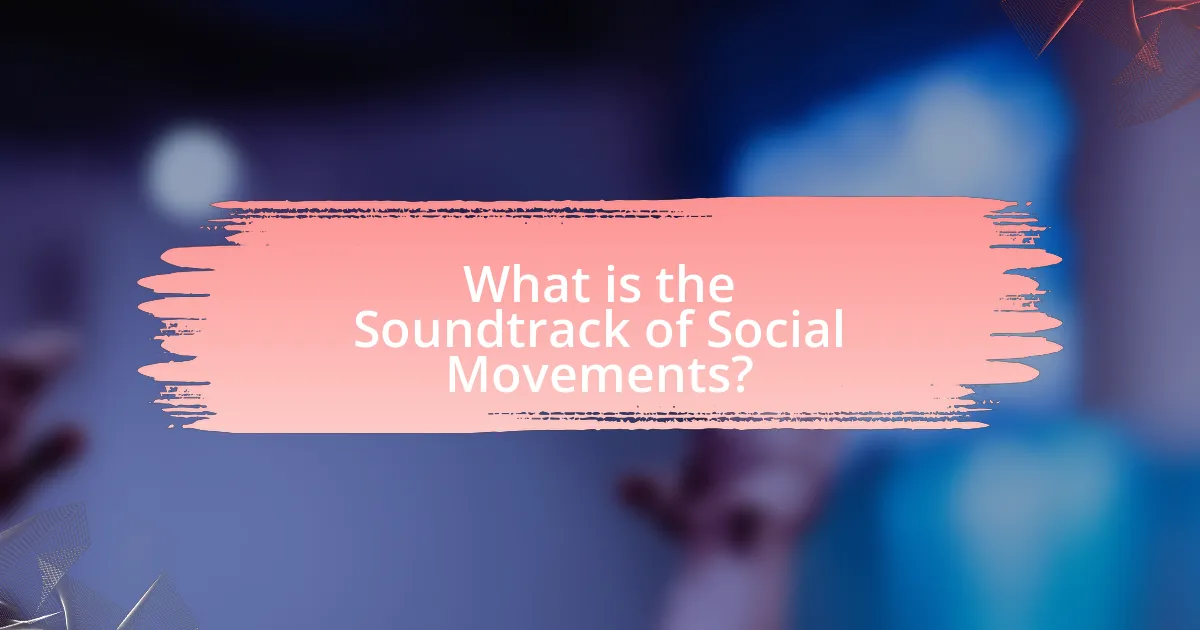
What is the Soundtrack of Social Movements?
The soundtrack of social movements consists of music that embodies the themes, emotions, and messages of activism and change. Historically, genres such as folk, rock, hip-hop, and reggae have played pivotal roles in mobilizing communities and expressing dissent. For example, songs like “We Shall Overcome” became anthems during the Civil Rights Movement, while artists like Bob Dylan and Public Enemy used their music to address social injustices. These musical expressions not only reflect the struggles and aspirations of movements but also serve to unite individuals and amplify their voices in the pursuit of social change.
How has music influenced social change throughout history?
Music has significantly influenced social change throughout history by serving as a powerful tool for expression, mobilization, and solidarity. For instance, during the Civil Rights Movement in the United States, songs like “We Shall Overcome” became anthems that united activists and communicated their struggles and aspirations for equality. Similarly, the anti-apartheid movement in South Africa was galvanized by music, with artists like Miriam Makeba and Hugh Masekela using their songs to raise awareness and inspire resistance against racial oppression. These examples illustrate how music not only reflects societal issues but also actively shapes and drives movements for change, making it an essential component of social activism.
What are some key historical examples of music driving social movements?
Music has historically played a crucial role in driving social movements, with notable examples including the Civil Rights Movement in the United States, where songs like “We Shall Overcome” became anthems for equality and justice. This song, rooted in African American spirituals, was used during protests and marches, uniting individuals in their fight against racial segregation and discrimination. Another significant example is the anti-war movement during the Vietnam War, where artists like Bob Dylan and Joan Baez used their music to protest against the war, with Dylan’s “Blowin’ in the Wind” questioning social injustices and calling for peace. Additionally, the LGBTQ+ rights movement saw the emergence of songs like “Y.M.C.A.” by the Village People, which became an emblem of pride and acceptance during the fight for gay rights in the late 20th century. These instances illustrate how music has served as a powerful tool for mobilization, expression, and solidarity in various social movements throughout history.
How do different cultures utilize music in their social movements?
Different cultures utilize music in their social movements as a powerful tool for expression, unity, and mobilization. For instance, during the Civil Rights Movement in the United States, songs like “We Shall Overcome” became anthems that galvanized activists and communicated their struggles and hopes. Similarly, in South Africa, the anti-apartheid movement employed music, such as the song “Nkosi Sikelel’ iAfrika,” to foster solidarity and resilience among oppressed communities. In Latin America, genres like Nueva Canción emerged as a means to address social injustices and promote political change, with artists like Mercedes Sosa using their music to challenge authoritarian regimes. These examples illustrate how music serves not only as a form of artistic expression but also as a strategic element in rallying support and articulating the demands of social movements across various cultures.
What role do music genres play in inspiring change?
Music genres play a crucial role in inspiring change by serving as a vehicle for social and political messages. Genres such as folk, hip-hop, and punk have historically provided a platform for marginalized voices, facilitating awareness and mobilization around issues like civil rights, anti-war movements, and social justice. For instance, the folk music of the 1960s, exemplified by artists like Bob Dylan, directly addressed social issues, influencing public opinion and activism. Similarly, hip-hop emerged as a powerful medium for expressing the struggles of urban communities, with artists like Public Enemy and Kendrick Lamar using their music to challenge systemic racism and advocate for change. These genres not only reflect societal issues but also galvanize listeners to take action, demonstrating their significant impact on social movements.
Which music genres have been most influential in social movements?
The music genres most influential in social movements include folk, rock, hip-hop, and reggae. Folk music, particularly during the 1960s, played a crucial role in the civil rights movement, with artists like Bob Dylan and Joan Baez using their songs to promote social justice and equality. Rock music became a voice for anti-war sentiments during the Vietnam War, with bands like Creedence Clearwater Revival and Jefferson Airplane expressing dissent through their lyrics. Hip-hop emerged as a powerful medium for addressing issues of racial inequality and police brutality, with artists such as Public Enemy and N.W.A. highlighting systemic injustices. Reggae, particularly through the works of Bob Marley, became synonymous with messages of resistance and empowerment, influencing movements for social change in Jamaica and beyond. Each of these genres has left a significant mark on the cultural landscape of activism, demonstrating the profound connection between music and social movements.
How do the themes in these genres resonate with social issues?
The themes in music genres such as protest songs, hip-hop, and folk music resonate with social issues by addressing inequality, injustice, and the struggle for rights. For instance, protest songs from the 1960s, like Bob Dylan’s “The Times They Are a-Changin’,” directly confronted civil rights and anti-war sentiments, reflecting societal unrest and advocating for change. Similarly, hip-hop has emerged as a powerful voice for marginalized communities, with artists like Kendrick Lamar using their lyrics to highlight systemic racism and police brutality, as seen in his song “Alright,” which became an anthem for the Black Lives Matter movement. Folk music, historically tied to social movements, often narrates the experiences of the oppressed, as exemplified by Woody Guthrie’s “This Land Is Your Land,” which critiques economic disparity. These genres not only mirror social issues but also mobilize listeners to engage in activism, demonstrating the profound impact of music on societal change.
Why is music considered a powerful tool for activism?
Music is considered a powerful tool for activism because it has the ability to unite people, convey messages, and inspire action. Throughout history, songs have served as anthems for social movements, such as “We Shall Overcome” during the Civil Rights Movement, which galvanized individuals and fostered a sense of community and shared purpose. Additionally, music can evoke strong emotions, making it an effective medium for raising awareness about social issues, as seen in the protest songs of the 1960s that addressed war and inequality. The rhythmic and melodic elements of music enhance memorability, allowing messages to resonate and spread more widely, thereby amplifying the impact of activism.
What psychological effects does music have on individuals and groups?
Music has profound psychological effects on individuals and groups, influencing emotions, behavior, and social cohesion. Research indicates that music can evoke strong emotional responses, such as happiness or sadness, by activating brain regions associated with emotion regulation, including the amygdala and prefrontal cortex. For instance, a study published in the journal “Psychological Science” by Gabrielsson and Lindström (2010) found that music can enhance mood and reduce stress, demonstrating its therapeutic potential. Additionally, music fosters social bonding and group identity, as seen in communal singing during protests or social movements, which can enhance solidarity and collective action. This phenomenon is supported by findings from the “Journal of Personality and Social Psychology,” where participants reported increased feelings of unity and shared purpose when engaging in group music activities. Thus, music serves as a powerful tool for emotional expression and social connection, impacting both individual well-being and group dynamics.
How does music foster community and solidarity among activists?
Music fosters community and solidarity among activists by serving as a unifying force that enhances collective identity and shared purpose. Through communal singing and rhythmic participation, music creates an emotional bond among individuals, reinforcing their commitment to a common cause. Historical examples include the Civil Rights Movement, where songs like “We Shall Overcome” became anthems that galvanized participants, fostering a sense of belonging and shared struggle. Research indicates that music can increase group cohesion and motivate collective action, as seen in studies highlighting its role in protests and social movements, such as the 2011 Arab Spring, where music was integral in mobilizing and sustaining activism.
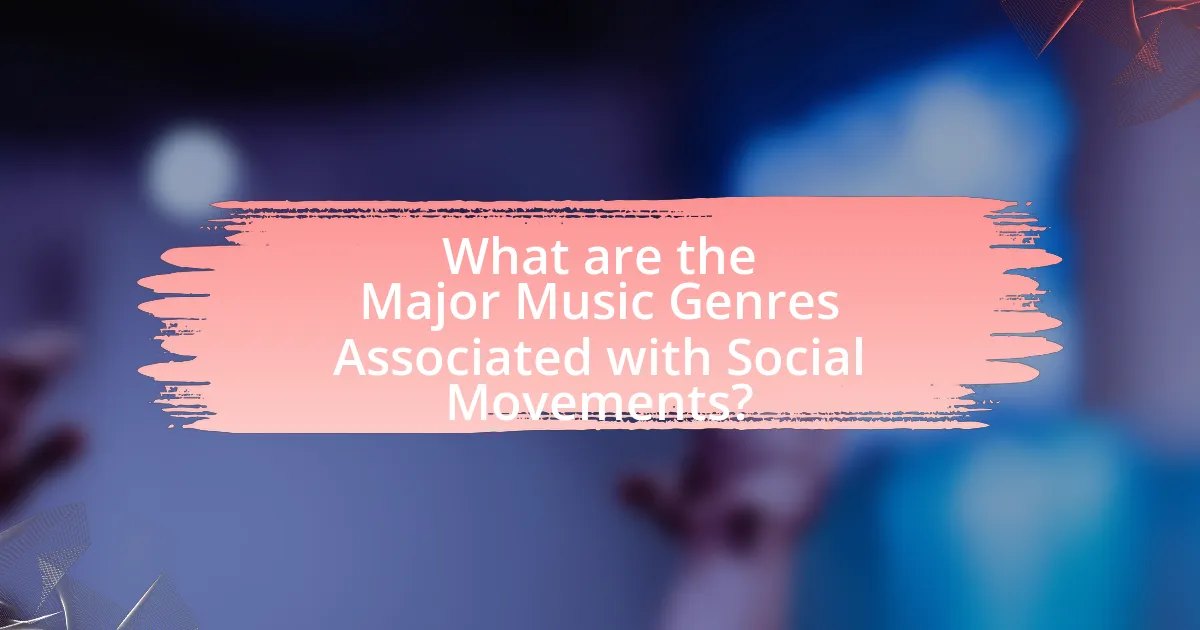
What are the Major Music Genres Associated with Social Movements?
The major music genres associated with social movements include folk, rock, hip-hop, and reggae. Folk music has historically served as a voice for social change, exemplified by artists like Woody Guthrie and Joan Baez during the civil rights movement. Rock music, particularly in the 1960s and 1970s, became an anthem for counterculture movements, with bands like The Beatles and Creedence Clearwater Revival addressing political issues. Hip-hop emerged in the late 20th century as a powerful medium for expressing social and political struggles, with artists like Public Enemy and N.W.A. highlighting systemic injustices. Reggae, particularly through the works of Bob Marley, has been influential in promoting messages of peace and resistance against oppression. Each of these genres has played a significant role in mobilizing communities and raising awareness about social issues.
How does folk music contribute to social activism?
Folk music contributes to social activism by serving as a powerful medium for expressing social and political messages, often reflecting the struggles and aspirations of marginalized communities. Historically, folk songs have been used to raise awareness about issues such as civil rights, labor rights, and anti-war sentiments, exemplified by artists like Woody Guthrie and Pete Seeger, who wrote songs that galvanized public support for social change during the Great Depression and the Civil Rights Movement. The participatory nature of folk music encourages community engagement and collective action, making it an effective tool for mobilizing individuals around shared causes.
What are the defining characteristics of folk music in social movements?
Folk music in social movements is characterized by its accessibility, communal participation, and ability to convey social and political messages. This genre often features simple melodies and lyrics that resonate with the experiences of everyday people, making it easy for large groups to sing along and engage in collective expression. Historically, folk music has played a crucial role in movements such as the Civil Rights Movement in the United States, where songs like “We Shall Overcome” became anthems of unity and resistance. The participatory nature of folk music fosters a sense of solidarity among activists, reinforcing shared goals and values. Additionally, folk music often draws on traditional cultural elements, which can help to preserve and promote the identity of marginalized communities within social movements.
Who are some notable folk artists that have inspired change?
Notable folk artists who have inspired change include Woody Guthrie, Joan Baez, and Pete Seeger. Woody Guthrie’s songs, such as “This Land Is Your Land,” became anthems for social justice and labor rights during the Great Depression. Joan Baez played a significant role in the civil rights movement and anti-war protests, using her music to advocate for peace and equality. Pete Seeger was instrumental in the folk revival of the 1960s and used his platform to promote environmental causes and social justice, famously co-writing “We Shall Overcome,” a key protest song during the civil rights movement. These artists utilized their music to address social issues, mobilize communities, and inspire collective action.
What impact does hip-hop have on contemporary social movements?
Hip-hop significantly influences contemporary social movements by providing a platform for marginalized voices and fostering community activism. The genre’s roots in social commentary allow artists to address issues such as racial inequality, police brutality, and economic injustice, thereby mobilizing listeners for collective action. For instance, during the Black Lives Matter movement, hip-hop artists like Kendrick Lamar and J. Cole used their music to highlight systemic racism and inspire protests, demonstrating the genre’s role in shaping public discourse. Additionally, studies show that hip-hop culture encourages political engagement among youth, with a 2018 report from the Pew Research Center indicating that young people who consume hip-hop are more likely to participate in social activism. This underscores hip-hop’s capacity to galvanize support for social causes and drive change in contemporary society.
How do hip-hop lyrics address social justice issues?
Hip-hop lyrics address social justice issues by articulating the struggles and experiences of marginalized communities, often highlighting systemic inequalities such as racism, poverty, and police brutality. Artists like Tupac Shakur and Kendrick Lamar use their platforms to raise awareness about these injustices, with songs like “Changes” and “Alright” serving as anthems for movements like Black Lives Matter. These lyrics not only reflect the realities faced by these communities but also inspire activism and solidarity, demonstrating hip-hop’s role as a powerful tool for social change.
What role do hip-hop artists play in activism today?
Hip-hop artists play a significant role in activism today by using their platforms to address social issues, advocate for marginalized communities, and inspire political engagement. For instance, artists like Kendrick Lamar and J. Cole incorporate themes of racial inequality and police brutality into their music, raising awareness and prompting discussions around these critical topics. Additionally, movements such as Black Lives Matter have been supported by hip-hop artists who participate in protests and use their influence to mobilize fans for social change. This engagement is evidenced by the increased visibility of hip-hop artists in political campaigns and social justice initiatives, demonstrating their impact on contemporary activism.
How does rock music serve as a voice for rebellion?
Rock music serves as a voice for rebellion by expressing dissent against societal norms and political oppression. This genre often features lyrics that challenge authority, advocate for social change, and resonate with the frustrations of marginalized groups. For instance, songs like “Fight the Power” by Public Enemy and “Killing in the Name” by Rage Against the Machine explicitly confront systemic injustice and encourage listeners to resist conformity. Historically, rock music emerged in the 1950s and 1960s as a response to cultural upheaval, with artists like Bob Dylan and The Beatles using their platforms to address civil rights and anti-war sentiments. The rebellious spirit of rock is further evidenced by its association with youth culture, where it has consistently provided a means for expressing dissatisfaction and rallying for change.
What historical events have been influenced by rock music?
Rock music has significantly influenced various historical events, particularly during the 1960s and 1970s, when it became a powerful tool for social change. For instance, the Civil Rights Movement in the United States saw artists like Bob Dylan and Sam Cooke using their music to promote messages of equality and justice, with songs such as “Blowin’ in the Wind” and “A Change is Gonna Come” becoming anthems for the movement. Additionally, the anti-Vietnam War protests were heavily accompanied by rock music, with bands like Creedence Clearwater Revival and Jefferson Airplane voicing dissent against the war through songs like “Fortunate Son” and “Volunteers.” These musical expressions not only reflected the sentiments of the time but also galvanized public opinion and mobilized activists, demonstrating rock music’s profound impact on social movements and historical events.
How do rock anthems become rallying cries for movements?
Rock anthems become rallying cries for movements by encapsulating the emotions and aspirations of a collective struggle, often through powerful lyrics and memorable melodies. These songs resonate with listeners, creating a sense of unity and purpose, which is crucial during social movements. For instance, “We Will Rock You” by Queen became an anthem for various protests due to its driving beat and empowering message, symbolizing resilience and determination. Additionally, historical contexts, such as the civil rights movement, saw songs like “A Change Is Gonna Come” by Sam Cooke inspire hope and action, reinforcing the connection between music and social change. The ability of rock anthems to evoke strong feelings and foster community makes them effective tools for mobilizing individuals around a common cause.
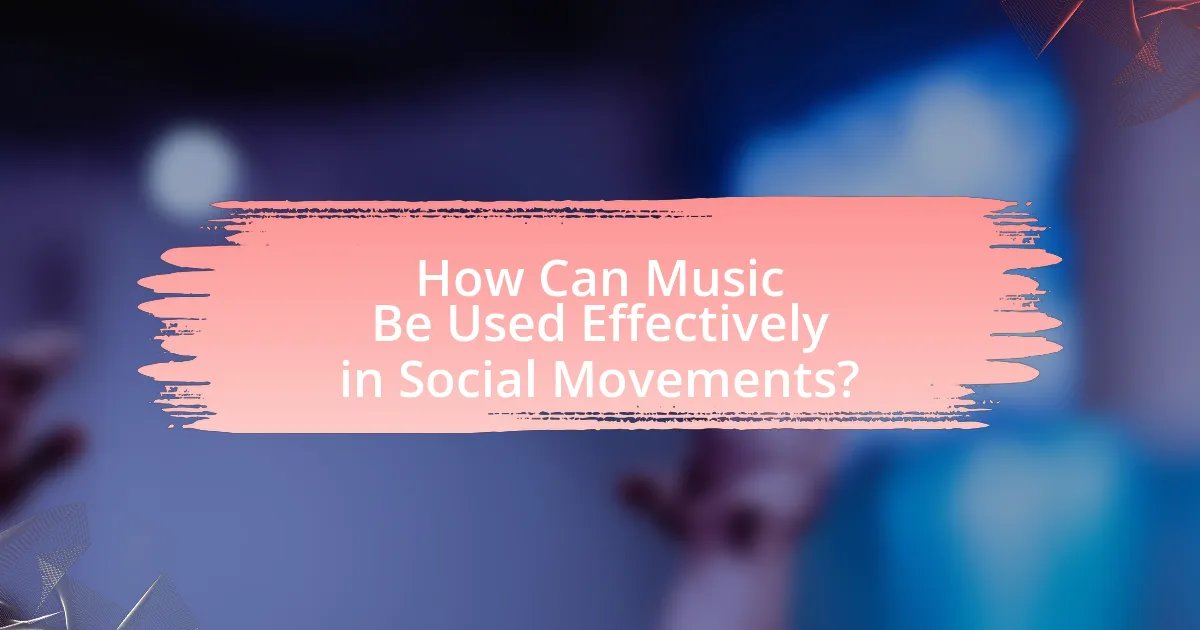
How Can Music Be Used Effectively in Social Movements?
Music can be used effectively in social movements by serving as a tool for mobilization, expression of identity, and emotional connection. It fosters unity among participants, as seen in the civil rights movement where songs like “We Shall Overcome” became anthems that galvanized activists. Additionally, music can communicate messages and raise awareness, exemplified by Bob Dylan’s “The Times They Are a-Changin’,” which encapsulated the spirit of social change in the 1960s. Research indicates that music enhances group cohesion and can increase the likelihood of collective action, making it a powerful medium for social movements.
What strategies can activists use to incorporate music into their campaigns?
Activists can incorporate music into their campaigns by using live performances, creating protest songs, and leveraging social media platforms for music sharing. Live performances at rallies or events can energize participants and draw attention to the cause, as seen in the 1969 Woodstock Festival, which became a symbol of the anti-war movement. Creating original protest songs can encapsulate the message of the campaign, similar to how “We Shall Overcome” became an anthem for the Civil Rights Movement. Additionally, social media platforms allow activists to share music widely, reaching diverse audiences and fostering community engagement, as demonstrated by the viral success of songs like “This Is America” by Childish Gambino, which addressed systemic racism.
How can playlists be curated to enhance the message of a movement?
Playlists can be curated to enhance the message of a movement by selecting songs that resonate with the movement’s themes, emotions, and goals. For instance, protest songs that address social justice issues, such as “Fight the Power” by Public Enemy, can amplify the urgency of a cause. Additionally, including tracks that tell personal stories or highlight historical struggles, like “Strange Fruit” by Billie Holiday, can evoke empathy and understanding among listeners. Research shows that music can influence emotions and behaviors, making it a powerful tool for mobilization and solidarity within movements. By thoughtfully combining genres and lyrics that reflect the movement’s core values, playlists can serve as both a rallying cry and a means of education, fostering a deeper connection to the cause.
What role do live performances play in mobilizing support?
Live performances play a crucial role in mobilizing support by creating a shared emotional experience that fosters community engagement and activism. These events serve as platforms for artists to convey messages of social justice, often drawing large crowds that amplify awareness and inspire collective action. For instance, concerts like Live Aid in 1985 raised significant funds and awareness for famine relief in Ethiopia, demonstrating how live music can unite people for a common cause. Additionally, studies show that live performances can increase participants’ sense of belonging and commitment to social movements, as seen in events organized by groups like Black Lives Matter, where music and performance art are integral to their demonstrations.
What are some best practices for using music in activism?
Best practices for using music in activism include selecting songs that resonate emotionally with the audience, utilizing music to unify participants, and ensuring the lyrics convey clear messages aligned with the cause. Emotional resonance can enhance engagement; for example, protest songs like “We Shall Overcome” have historically galvanized movements by fostering a sense of solidarity. Unifying music, such as anthems or chants, can create a collective identity among activists, as seen in the civil rights movement. Additionally, clear and impactful lyrics can effectively communicate the goals of the activism, as demonstrated by songs like “Fight the Power” by Public Enemy, which directly addresses social injustices.
How can artists collaborate with activists for greater impact?
Artists can collaborate with activists for greater impact by using their creative platforms to amplify social messages and engage wider audiences. For instance, musicians can write songs that address social justice issues, thereby raising awareness and inspiring action among listeners. Historical examples include the collaboration between artists like Bob Dylan and civil rights activists, where music became a powerful tool for mobilization during the 1960s. Additionally, visual artists can create impactful installations or murals that highlight activist causes, fostering community dialogue and engagement. This synergy not only enhances the visibility of social movements but also enriches the cultural narrative surrounding them, making the messages more relatable and accessible to diverse audiences.
What are the potential pitfalls of using music in social movements?
The potential pitfalls of using music in social movements include oversimplification of complex issues, alienation of certain groups, and commercialization that can dilute the original message. Oversimplification occurs when music reduces multifaceted social issues to catchy slogans or melodies, potentially leading to misunderstandings about the movement’s goals. Alienation can happen if the chosen music genre does not resonate with all demographics involved, thereby excluding voices that are crucial for a unified front. Commercialization poses a risk when music becomes commodified, as seen in instances where protest songs are co-opted for profit, which can undermine the authenticity and urgency of the movement. Historical examples include the commercialization of protest music during the Vietnam War, where artists like Joan Baez faced challenges in maintaining the integrity of their messages amidst rising commercial interests.
How can individuals support the soundtrack of social movements?
Individuals can support the soundtrack of social movements by actively engaging with and promoting music that embodies the values and messages of these movements. This can be achieved through sharing songs on social media platforms, attending concerts or events that feature activist musicians, and purchasing music from artists who advocate for social change. For instance, during the Civil Rights Movement, songs like “We Shall Overcome” became anthems that unified and inspired participants, demonstrating the power of music in mobilizing communities. By amplifying these musical expressions, individuals contribute to the cultural narrative and visibility of social movements, reinforcing their impact and reach.
What actions can people take to promote music that inspires change?
People can promote music that inspires change by actively sharing and supporting artists whose work addresses social issues. This can be done through social media platforms, where individuals can post about songs, create playlists, and engage in discussions that highlight the messages behind the music. Additionally, organizing or participating in events such as concerts, rallies, or community gatherings that feature these artists can amplify their reach and impact. Research shows that music has historically played a crucial role in social movements, such as the Civil Rights Movement, where songs like “We Shall Overcome” became anthems for change, demonstrating the power of music to unite and inspire action.
How can community events leverage music for social impact?
Community events can leverage music for social impact by using it as a tool for engagement, awareness, and mobilization around social issues. Music has historically played a crucial role in social movements, serving as a unifying force that brings people together and amplifies messages. For example, during the Civil Rights Movement, songs like “We Shall Overcome” became anthems that inspired collective action and solidarity among activists. Research indicates that music can enhance emotional connections and foster community identity, making it an effective medium for promoting social change. By incorporating local artists and culturally relevant genres, community events can resonate more deeply with participants, encouraging dialogue and action on pressing social issues.
